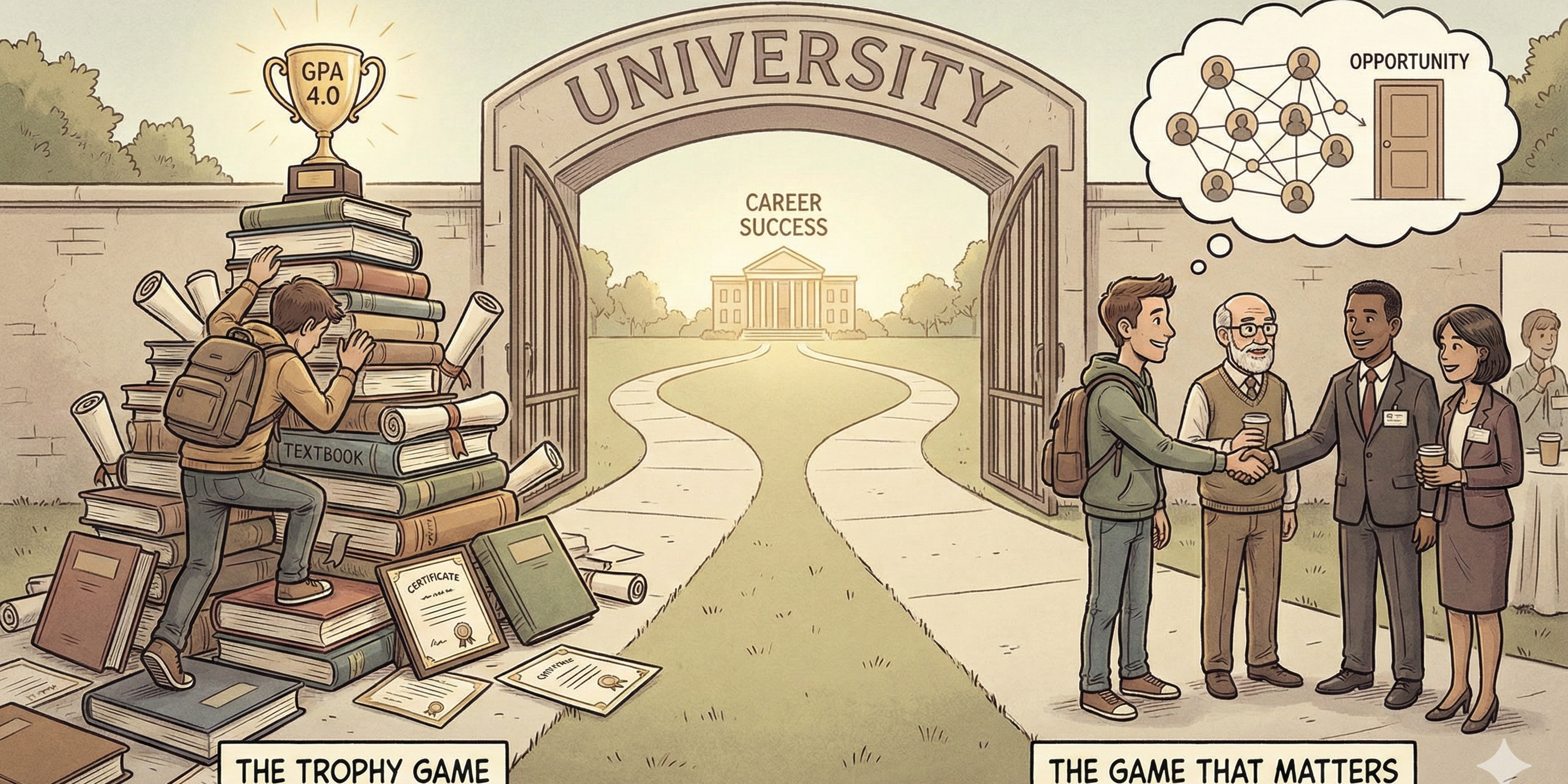How to Become a 10x Student: Making the Most of University

😔 Not Enough?
Have you ever thought that you're not doing enough in your university life? Maybe you want to get ahead in your career. In this blog post, I'll teach you ALL the tips, tricks, and techniques I use to become a 10x student - theoretical and practical. The concept of a 10x student came from a 10x developer/engineer, a person so mythical of rarity who's 10 times more productive than others with the same level of expertise.
🎯 Target Audience
This blog post is not just for students in computer science and technology-related programs but also students in any field at any university. Everything I recommend here is free so don't worry!
To You, The Reader
Before anything, for the time being without limitations, imagine what you want to be in the next year. Maybe you want to be hired by a Big Tech company, found a start-up, achieve 10+ certifications, be recognized in your university, win local/international competitions, or graduate from a boot camp.
This blog post is not a silver bullet and does not guarantee you success within a certain timeline, but should you not just follow and understand it but discover and thrive on your own, you might succeed. Let's get started.
📙 The Basics
Academics
To become a 10x student, you must first get ahead in your academic game. It's hard to go out of your way to do extracurriculars and other activities if you struggle to keep up with the courses and workload. You can also do them, but just don't forget your quizzes, technicals, assignments, and others.
I struggled in my first-year calculus course, so my morale was down, and I had little improvement to become a 10x student.
If the curriculum in your student portal can be viewed, try to scour and plan. Then, identify what you are good at and what you are not. Ask your seniors personally or in chat what will be taught and what to expect.
Organizations
Joining relevant organizations is worth it. Some have an annual membership fee. You can attend their events, network and work with like-minded individuals, and ask for advice from your seniors. You can list them in your portfolio or LinkedIn profile, or talk about your impact on job interviews.
Ever thought about becoming a student leader? Depending on your strong points and interests, you can join various committees of organizations, such as creatives if you want to make publication materials, publications if you are great at writing, technical if you are great with audio-visual and configuring settings, and more. If you want, you can climb the hierarchy and strive to become an executive (President, VP, Auditor, Secretary, etc) so you can continue to steer the organization in your way. Together with your fellow officers, you'll organize talks, workshops, competitions, study sessions, and outreach programs, among others. You can even explore organizing podcast and YouTube content!
In the Philippines, some students love and dedicate so much time to their organizations that they jokingly call their program "BS Org". It can be good or bad, but if you keep an eye on your academics and you are enjoying it, you are doing great.
Events
Organizations organize events. Students attend them either in-person or online to hopefully learn useful knowledge, get some insight, and win some prizes! Search social media platforms like Facebook and LinkedIn for relevant events in your industry within and outside your university. While attending, you might have a eureka moment for your next project or thesis or figure out a solution for existing ones.
However, going to events just to learn is not enough. What you learned there will become common knowledge in 6 months or so, maybe next month! You can make the most out of events through networking.
Networking
Once you attend external events, you'll meet with people of different backgrounds, from industry experts to fellow students. Listen and understand the talks while networking with attending individuals. You might be shy and intimidated, or maybe not. The goal is to spark a conversation with them at the right time. Here are some rough steps:
- Search: Search for someone you want to network with. It can be anyone. Maybe the speakers themselves or your seatmate.
- Meet: During the networking session or after the event, walk up to them and say hi while striking for a handshake.
- Questions: You want to ask questions regarding the talk or how they found the event. Maybe some insights or predictions in the direction of the industry. Depending on the vibe, you can question further and learn. Questioning is an art. Don't ask them how they can solve your problems. Instead, you want to phrase it in a question on whether they have experienced the problem you are dealing with and what they do to solve it.
- Parting: Before parting, always hand over your business card (we'll discuss this later) and ask them if you could take a picture together. Afterward, go for a handshake and say Nice meeting you.
Volunteering
Similar to being a student leader in an organization, you can volunteer for diverse external communities in and out of your city. From specialized communities like Google Developer Groups Cloud Manila to your local church, publication, or cause you believe in.
Being affiliated with them opens doors to opportunities, maybe a free entrance to a paid or exclusive event, insider knowledge, and applications for higher positions.
For example, I volunteered for an organization that got me into a paid event for free, where I met an instructor for a boot camp opening soon who encouraged me to apply. I did and was accepted, finished the boot camp, and got hired as an AI Engineer Intern.
Professional Email
Gone are the days of gigachad143@gmail.com, xx.gamerguy.xx@outlook.com, and mrwhopper@yahoo.com (Do not contact these emails - I made them up). As early as now, decide which username you want to go by in emails. Professionally, this would be some permutation of your real name. For example, mine is alpharomercoma. Aside from email, I use this for my social media accounts such as:
- linkedin.com/in/alpharomercoma
- github.com/alpharomercoma
Changing them in the future will be complicated, especially if you use a unique one for each. This is important since you will be putting these in your business cards (we'll tackle this later!), and if you change them, you have to reprint the cards because links are broken.
Resume

Your resume is one of the most important pieces in advancing your career. UNFORTUNATELY, there are a lot of technicalities in creating one, and many companies and creators have built their brands and content to address such issues. Things such as what to include and what not. Will you be biased against what you put? Should you include your address? Is the ATS processing your paper right? and such questions.
No matter, as a university student, you should have one as soon as you can. Update it every month or two with new certificates and accomplishments. I promise you that your future self will thank you. Soon, I'll make a blog post about crafting an outstanding industry-grade resume. For now, please use FlowCV to easily create one for free.
Competitions
Participating in relevant competitions and hopefully winning some is one of the best ways to get your name out there and be recognized. Not only will you be posted on their social media and seen by their following, but you can post about it on LinkedIn for the world to see. May the competition be a hackathon/ideathon, competitive programming, debate, writing/creative, or quiz bees, share your preparation, experience, and certificates you received.
If you don't know about any upcoming competitions yet, ask your professors or go to the faculty of your program at your university. It's a great opportunity to be recognized by the department and the academic varsity team if it exists. Do also search online.
Online Courses & Certificates
There are a lot of online learning platforms offering courses with certificates for every industry such as edX, coursera, or udemy. For a wide variety of technology-related courses, I highly recommend IBM Skills Build. Although the true value of certificates is heavily debated, what you learn along the way is invaluable.
The first three platforms are paid, but edX has a Financial Assistance program that dramatically reduces the cost for a single program by 90%, however, I'm not sure about the rest.

LinkedIn is essentially the Facebook of professionals. Making and optimizing a LinkedIn profile can be a whole nother blog post on its own, but the value of it cannot be discounted. Unfortunately, extremely few students use LinkedIn at least in my observation in my university. It's not until their final year that they make on for their internships to get hired.
LinkedIn is a GOLDMINE for learning, following companies for opportunities, building your professional brand, and a ton more. Some students argue they might not have much to post or show on LinkedIn early on to use and take advantage of the platform. It's understandable, but wouldn't you rather post each award or achievement gradually, gaining a following over time, than posting it all at once with absolutely no audience at all because you just created one?
Moreover, on Facebook, you may be shy about posting your achievements but here, you are encouraged to display them in their most glorious form for everyone to see. Why? To be seen and recognized not just by fellow professionals but also by recruiters to establish competency and increase our chances of being headhunted or hired.
During networking, you can add each other on LinkedIn and keep in touch with one another. If you have a matter to discuss with them, maybe help with a thesis or help in a job search, here's a USEFUL tip that will make them more likely to reply: take a photo of yourselves before parting in networking. Send it to them then saying something like:
Hi, Mr./Ms. ____!
We've actually met at _______ and I had the pleasure of talking with you.
<Proceed with your concern>
LinkedIn Recommendations

To set yourself apart by not just creating a LinkedIn profile early is to ask for recommendations from your professors before the term ends. If you perform well in their course, you should reach out to them and ask for one. It's highly probable that they are on the platform and will give you one, further boosting your credibility. Moreover, drag your classmates and organization officers on LinkedIn and ask for theirs too.
I'm now in my third year and have farmed almost all of the Computer Science faculty's recommendations, from assistant professors to doctorates. As a bonus, when people view their profiles, they will see that they gave you a recommendation. Don't be stingy, and return the favor! So, go forth and send that request.
🔥 Be the Change
This is beyond being a student leader in an organization. You can be an officer who completely abides by and does their duties, but if you want to level up and lead the change, you must venture into opportunities a few or no one has gone to yet. Here are some ideas of what you can do:
- Establish your Initiative: For existing organizations, a cause you believe in with the skills you have or want to have. For example, you now frequently attend events, but you're always on your own. Why not bring along your classmates or, better yet, your organization? Send them the registration link, and they can also learn and participate. Send not just events but also helpful courses and resources.
- Found your organization: Depending on your program, there are lots of big names, especially in tech, where you can establish a local student chapter in your university and represent them. You'll have benefits from their merch, vouchers, and access to their network. However, this will be monumentally tough as you'll be faced with challenges as you need to juggle both your studies and the organization, as well as needing trustworthy and reliable fellow officers to make this possible. Here are some organizations you can found in your university: AWS Cloud Club, GDG on Campus, ACM Student Chapter, IEEE Student Branch
- Apply for student ambassador: Compared to an organization representing a big brand, student ambassadors are towards a single individual to promote and represent them on the campus. Receiving the same benefits and possibly more, this opportunity will massively positively impact your career and make you a figure in your university and maybe even your country. Search on the internet for relevant student ambassador programs in your industry and apply when they are open. Some notable programs include Microsoft Learn Student Ambassador and GitHub Campus Expert. You can find a list of developer-oriented ambassador programs here.
😎 Student or Professional? Both!
These are generally what professionals already do and have, so we want to replicate them. "When in Rome, do as the Romans do". Here are some practical tips that can set you apart from the competition.
Email Signature

An email signature will definitely help you stand out to whomever you are reaching out to. It signals professionalism and trustworthiness. Put your title, like Software Engineer or AI Engineer, add your professional picture and social media links, a little disclaimer, and you are golden. Your email will have more weight and impact. I easily designed mine on Blinq in no time, so do try it out.
Digital Business Card

A modern way to get your name out there while networking. Show your phone with this open and have them scan the QR code or take a picture that links to your digital business card. Very easy to create in 5 minutes or so for free.
I found out about this when speaking with a Tesla representative in BGC, Metro Manila. After discussing matters, he presented this and said to contact him when the time comes. I was astonished and created my own with the same application, Blinq.
NFC Business Card
Another modern piece of technology to add to your repertoire is an NFC Business Card. This is used together with your digital business card to share it seamlessly. You tap it on the other person's phone, and a pop-up will show, linking to your digital one.
However, this requires the other person to have their phone out, and not all have NFC or enabled. Moreover, these are relatively pricey, and you only get one or a few of them.
Personally, I find this nice to have but not necessary. I designed mine on Canva and had it made on Shopee. I can't tell you which one is good to order from because of logistics, so do browse the shopping platforms in your country for services.
Classic Business Card


The classic business card is not going away any time soon. In your university, you can hand these out to your friends and professors, and they will be impressed that you have one. In the industry, however, these are very common, if not expected.
Compared to NFC business cards, you can hand these out to many people at once at a low cost in no time.
I remember going to an international event at BGC, Metro Manila, full of professionals in suits and ties. Everyone was exchanging business cards, while I only had an NFC digital one. This was the moment I knew an NFC card wasn't enough, and I decided to design one on Canva and have it printed for me.
You can experiment with which business card looks good to you, depending on your industry. You can add your logo, contacts, social media links, and even a QR Code. Mine has been inspired by the uncountable business cards I received, striking for a modern, minimalistic yet eye-catching design.
👾 Generative AI Tools
This guide would not be complete without some form of AI. While you leverage AI for your studies and workloads, do practice ethical use of it no matter your program.
- OpenAI's ChatGPT: The most popular general-purpose generative AI
- Google's Gemini: General-purpose generative AI
- Anthropic's Claude AI: Best for programming
- Perplexity AI: Best for searching with references
- Groq: Best if you need something fast
- Deepseek R1: The newest addition to the generative AI space; more performant and cost-efficient than ChatGPT o1
🚀 Overall
Here, I hopefully shared with you all the techniques in my repertoire, both theoretical and practical. This is in no way a complete list to become successful but another guide one can apply and keep in mind.
With that said, an important question remains:
Q: Am I now a 10x student myself?
A: It doesn't matter!
What matters is that we're doing our very best to learn and advance our careers, taking advantage of every opportunity.
So, what’s your next step? Will you attend an event, create your LinkedIn profile, or found your organization? Whatever it is, start today. Your future self will thank you for it.
Go forth, make your mark, and lead the change of tomorrow! 🚀

